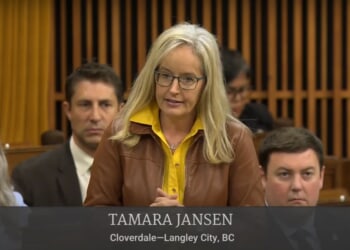The most formidable impediments to President Donald Trump’s agenda are lodged firmly in the judicial branch.
This week’s injunction comes courtesy of U.S. District Judge Indira Talwani in Massachusetts, who issued a temporary order limiting the Trump administration’s ability to block Medicaid funds from going to certain Planned Parenthood entities. More affirmatively stated: Talwani ordered the government to funnel tax dollars towards Planned Parenthood. (RELATED: Judges Play Their Trump Card Against President — And SCOTUS, Too)
Planned Parenthood objected to Section 71113 of the One Big Beautiful Bill Act (OBBB), which prohibits federal payments to entities which provide for abortions, except in rare circumstances. Planned Parenthood’s legal counter is largely premised on First Amendment grounds.
“The true design” of the OBBB provision is “simply to express disapproval of, attack, and punish Planned Parenthood, which plays a particularly prominent role in the public debate over abortion,” the nonprofit wrote in its complaint.
Talwani’s order, issued July 21, echoes these concerns.
“There is a significant public interest in the implementation of duly enacted statutes,” she notes in an opinion issued July 21.
“At the same time, when social policy burdens the exercise of First Amendment rights, the public interest in protecting those rights may outweigh the public interest in allowing such policy to take effect,” she continued.
Talwani’s ruling only applies to certain Planned Parenthood entities, heeding the restrictions on universal injunctions established by the U.S. Supreme Court in June.
.@POTUS: The Supreme Court has delivered a monumental victory for the Constitution, the separation of powers, and the RULE OF LAW in striking down the excessive use of nationwide injunctions 🔥 pic.twitter.com/iQUR3xmMt8
— Rapid Response 47 (@RapidResponse47) June 27, 2025
Trump hailed the 6-3 decision as a triumph. Victory may be in sight, but it remains out of the Trump administration’s grasp.
The landmark ruling “is likely to be muted,” law professor Nicholas Bagley told USA Today.
“Look, there’s lots of other ways to get widespread relief,” Bagley continued. “The fact is they are available now.”
Federal judges have two primary means of blocking, or functionally mandating, federal action.
In the first place, they might appeal to the Administrative Procedure Act (APA). The APA regulates government departments. If Trump signs an executive order which mandates intra-department changes, judges can block those changes on the basis of the APA.
For instance, mandating mass layoffs in the Department of Health and Human Services (HHS). U.S. District Judge Melissa DuBose temporarily blocked the firings July 1, claiming HHS had acted in an “arbitrary and capricious” manner that was “contrary to law.”
The second means of redress for federal judges is the class action lawsuit.
U.S. District Judge Joseph Laplante granted a class-wide preliminary injunction to complainants protesting Trump’s executive order limiting birthright citizenship July 10.
The plaintiffs included children of non-citizens, non-citizens with U.S.-born children, and “Barbara,” a pregnant woman who is not a U.S.-citizen, but has an “asylum application pending,” according to legal filings. But it’s not as though Barbara just washed up on American shores yesterday. She’s resided in the United States since 2024, the document notes.
U.S. District Court Judge Randolph Daniel Moss (Obama appointed) BLOCKS President Trump’s executive order that BANNED migrants who illegal crossed into the U.S. from seeking asylum.
U.S. Attorney General Pam Bondi: “A rogue district court judge is already trying to circumvent… pic.twitter.com/w2DzMLjlzt
— RedWave Press (@RedWave_Press) July 2, 2025
U.S. District Judge Randolph Moss delivered perhaps the most breathtaking class relief of all July 2. Moss’ opinion makes a class of those affected by Trump’s Proclamation “Guaranteeing the States Protection Against Invasion.”
That proclamation imposes restrictions on asylum claims made by illegal aliens. Eligibility for asylum is broad, at least, on paper. One must make the case that he is facing persecution, or fears persecution, due to his: race, religion, nationality, membership in a particular social group or political opinion.
“Persecution” is a rather vast category. As is “membership in a particular social group.” A Venezuelan gangbanger might credibly claim that he is being persecuted by law enforcement for his membership in a neighborhood clique.
That hypothetical gangbanger would have to be physically present in the United States to apply for asylum in the first place, which very often happens. (RELATED: Court Docs Reveal How Many Tren De Aragua Gangbangers On ICE’s Deportation List)
The effect of Moss’ ruling is to sweep all those who might have a credible claim of persecution into one giant class. All they have to do is sneak into the United States, claim persecution and profit.
With federal judges as creative as Moss, the Trump administration’s courtroom troubles have no end in sight.
Follow Natalie Sandoval on X: @NatSandovalDC



![Former Bravo Star Charged After Violent Assault Using a Rock-Filled Sock in Tennessee Walmart [WATCH]](https://www.right2024.com/wp-content/uploads/2025/07/Former-Bravo-Star-Charged-After-Violent-Assault-Using-a-Rock-Filled-350x250.jpg)



![Illegal Alien Walked Free After Decapitating Woman, Abusing Corpse for Weeks [WATCH]](https://www.right2024.com/wp-content/uploads/2025/07/1753013138_Illegal-Alien-Walked-Free-After-Decapitating-Woman-Abusing-Corpse-for-350x250.jpg)
![NYC Man Snatches Child Off The Sidewalk, Parents Chase Him Down [WATCH]](https://www.right2024.com/wp-content/uploads/2025/07/NYC-Man-Snatches-Child-Off-The-Sidewalk-Parents-Chase-Him-350x250.jpg)
![Man Arrested After Screaming at Senators During Big Beautiful Bill Debate [WATCH]](https://www.right2024.com/wp-content/uploads/2025/06/Man-Arrested-After-Screaming-at-Senators-During-Big-Beautiful-Bill-350x250.jpg)
![Leftists Lose Their Minds After Jason Kelce Celebrates Being an American [WATCH]](https://www.right2024.com/wp-content/uploads/2025/07/Leftists-Lose-Their-Minds-After-Jason-Kelce-Celebrates-Being-an-350x250.jpg)






